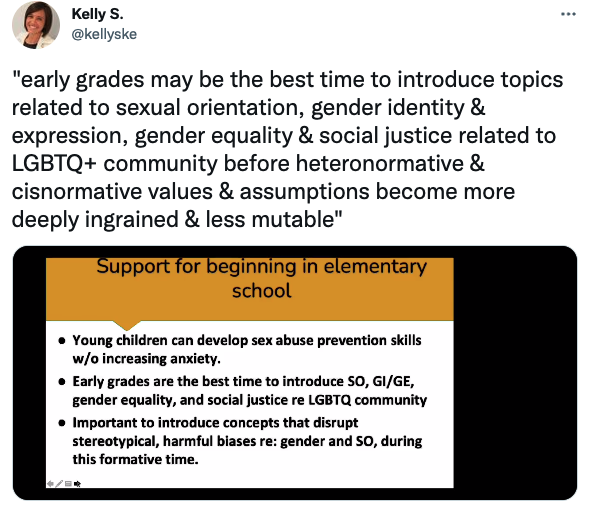In an online meeting with sex educators, two researchers said that sex education is “most important” for children, and, they stated, “It can be strongest when it starts in elementary school.
Eva S. Goldfarb, Ph.D., and Lisa D. Lieberman, Ph.D., both from the Department of Public Health at Montclair State University, cited an article they’d published and said:
This review suggests that not only are younger children able to discuss sexuality related issues, but that the early grades may in fact be the best time to introduce topics related to sexual orientation, gender identity and expression, gender equality and social justice related to the LGBTQ+ community before heteronormative and cisnormative values and assumptions become more deeply ingrained and less mutable.
That’s right. Teach young children – even preschoolers – about gender ideology and homosexuality. And do so before basic truths – such as the reality that humans almost always form opposite-sex relationships or that people come in two forms, male or female – get “more deeply ingrained” and less easy to change.
Kelly S. is a homeschooling mom, who is researching public school indoctrination and host of “A Time to Stand” podcast. She exposed the meeting about the “Comprehensive Sexual Education” (CSE) agenda in a series of tweets.
Comprehensive Sex Education (CSE) is a radical “rights-based” and “pleasure-based” sexuality curriculum that is being taught in many public schools, replacing the facts-based sex education of the past.
The researchers and others who presented at the online forum aren’t a fringe group. They are mainstream academicians and producers of sexual education curriculums and so-called “National Sex Education Standards” used by states and school districts across the country.
The researchers were delighted to find that sexual education didn’t just occur in health classes, but across the curriculum, “in literature classes, in math classes, in social studies classes, in P.E. classes and art.”
"The other piece that was surprising…in a good way, was how much in general we found sex education going on outside of the health education classroom, even in middle and high school…in literature classes, in math classes, in social studies classes, in P.E. classes and art"
— Kelly S. (@kellyske) April 2, 2022
The online conference was sponsored by The American School Health Association, Shape America, and the Society for Public Health Education. SIECUS: Sex Ed for Social Change (their tagline explains their agenda) and Advocates for Youth, an LGBT activist organization, hosted the event.
While the first part of the online event featured Goldfarb and Lieberman, the rest was given over to explaining the “National Sex Education Standards,” produced by the Future of Sex Education (FoSE). The FoSE guidelines were released in 2020, at the beginning of the COVID-19 pandemic. They updated previous standards, published in 2012.
Presenters said the new guidelines were vetted by a host of contributors and reviewers, including folks from GLSEN, which promotes “gay-straight alliance” clubs in schools; Gender Spectrum, which pushes transgender ideology; and Planned Parenthood, the largest producer and distributor of sexual education curriculum in the U.S.
The new guidelines focus more on “intersectionality,” presenters stated, “because we want to make sure that young people are understanding all of their different identities and exploring each of those identities and how they relate to their sexual identity and how they’re developing and how that impacts their sexual health.” FoSE standards suggest teaching about “gender identity” in kindergarten.
Because gender activists are constantly inventing sexual orientations and gender identities, FoSE offers an updated, fifteen-page glossary of terms students should learn about in sexual education. The list includes terms like ableism, cisgender, gender expansive, pansexual, privilege, reproductive justice, sex assigned at birth, two-spirit and unconscious bias.
Attendees were warned that even this newer list was probably already outdated, because, “as we know, language is always evolving.”
These sex educators believe that it’s not enough to teach about anatomy and physiology, puberty, pregnancy, reproduction and sexually transmitted infections.
They think children must be taught about gender identity and expression; sexual orientation and identity; interpersonal violence; and “consent and healthy relationships,” that is, how to give or refuse consent to sexual activities. The updated “standards” include all these as major content units for children in grades K-12.
And again, as they explained, the best time to start is with the preschoolers and kindergartners. Before they get those pesky values and assumptions in their little heads.
Here’s the rest of the full thread of tweets from Kelly S. It shows what sex educators think children should know. Kudos to her for exposing this dark, twisted agenda.
The Future of Sex Education wants Comprehensive Sexuality Ed (CSE) taught to all grades, in all states, and across most subjects, through a Social Justice Pedagogy using the lenses of Intersectionality, Language, Equity, etc. pic.twitter.com/zKCgYpVtGe
— Kelly S. (@kellyske) April 2, 2022
The presentation discusses teaching CSE through a Lens of Language, "All language is constantly evolving; new terms are introduced, while others fade from use or change their meaning over time," by an image of an X by "he, him, his" & "she, her, hers" & a ✅️ by "xe, xem, xyr" pic.twitter.com/DSSzUjxh6t
— Kelly S. (@kellyske) April 2, 2022
The speaker's correction mid-sentence speaks volumes, "Sex education is *most important* can be strongest when it starts in elementary school."
and to present CSE:
"…before heteronormative and cisnormative values and assumptions become more deeply ingrained and less mutable."— Kelly S. (@kellyske) April 2, 2022






